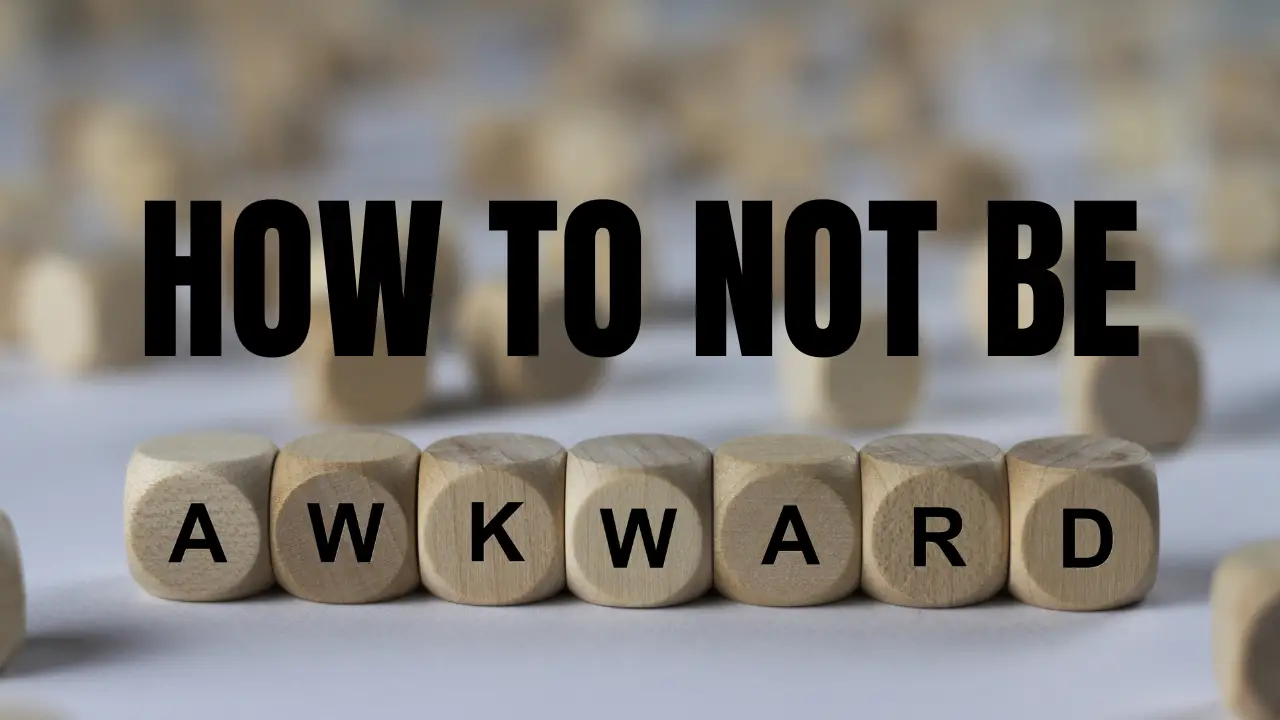How To Not Be Awkward Around People: 15 Tips

We’ve all been there—standing in a room full of people, wondering what to say or do, feeling like every move we make is magnified. That uncomfortable sensation of being awkward around people can be paralyzing. But guess what? You’re not alone in feeling this way. The best part? You can overcome it. Whether you’re at a party, meeting new people, or even talking to someone familiar, these 15 tips will help you break free from social awkwardness and connect with others confidently.
1. Embrace Silence Without Fear
One of the most common causes of awkwardness around people is the fear of silence. We often feel the need to fill every gap in conversation, which can lead to unnecessary anxiety. But here’s a powerful truth: not every moment requires words. Silence can actually be comforting, allowing both you and the other person to take a breath and reflect on the conversation. Instead of rushing to speak, give yourself permission to pause. A moment of quiet can give you time to think and make your next words more meaningful.
By embracing silence rather than fearing it, you can reduce the pressure you put on yourself during social interactions. The fear of awkwardness thrives when we believe that silence is bad, but when you realize that it’s just another part of natural human interaction, you’ll start to feel more relaxed. When you are calm, the people around you will sense that, and the conversation will flow more easily.
2. Master the Art of Balanced Eye Contact
Eye contact is one of the most significant nonverbal cues in social interactions. Too little eye contact can make you seem disinterested or nervous, while too much can make the other person feel uncomfortable. Finding that sweet spot can help you appear confident without seeming too intense. Ideally, you want to maintain eye contact for a few seconds, then break it naturally by glancing away or nodding as you listen.
Balancing your eye contact is easier when you’re mindful of the other person’s body language. Are they holding your gaze comfortably, or do they seem uneasy? Adjusting your eye contact accordingly not only helps you avoid awkwardness but also shows that you’re attuned to their feelings. This small yet powerful gesture can make your interactions feel more fluid and genuine.
3. Shift Your Focus from Yourself to Others
Feeling awkward often comes from being too focused on how you’re being perceived. You worry about how you’re coming across, which makes you second-guess everything you say or do. A simple way to overcome this is by shifting your attention from yourself to the person you’re interacting with. Ask questions, show interest in their opinions, and make it about them. When you stop fixating on your own awkwardness and start genuinely engaging with others, you’ll feel more connected and less self-conscious.
When you’re genuinely curious about someone else, conversations become easier because you’re not stuck in your own head. People enjoy talking about themselves, and by focusing on them, you’re less likely to worry about whether you’re being awkward. This shift in focus not only reduces your own anxiety but also makes the other person feel valued, creating a more natural and comfortable interaction.
4. Use Your Smile to Break the Ice
Smiling is one of the simplest yet most powerful ways to ease tension in any social situation. It instantly communicates warmth, openness, and friendliness, which can make both you and the people around you feel more comfortable. Whether you’re meeting someone for the first time or reconnecting with an old friend, a genuine smile can set a positive tone for the interaction.
However, don’t force it—people can sense when a smile is fake. Practice smiling in moments when you feel calm, so it becomes a natural part of how you interact with others. The more you smile, the more approachable and confident you’ll appear. This small act can create a welcoming atmosphere, helping you and those around you feel more at ease.
5. Laugh at Yourself and Lighten the Mood
Everyone makes mistakes or has awkward moments—it’s part of being human. But how you handle those moments can make all the difference. If you stumble over your words or accidentally say something awkward, don’t let it throw you off. Instead, laugh it off! Being able to poke fun at yourself shows that you’re confident and don’t take things too seriously, which can diffuse any tension in the room.
When you laugh at yourself, you not only ease your own discomfort but also make the people around you feel more relaxed. They’ll appreciate your lightheartedness, and it can help shift the focus away from any awkwardness. Plus, it reminds others that it’s okay to be imperfect, creating a more comfortable environment for everyone.
6. Slow Down and Pace Your Speech
Speaking too quickly can give off the impression that you’re nervous or trying to rush through the conversation. This can heighten your feelings of awkwardness, as it may cause you to stumble over your words or lose track of your thoughts. To counteract this, consciously slow down your speech. When you speak at a measured pace, you give yourself time to think, which reduces the likelihood of awkward pauses or mistakes.
Slower speech also helps you appear more confident and in control. It allows you to articulate your thoughts clearly and gives the other person time to process what you’re saying. This creates a smoother conversation, making you feel less awkward and more engaged in the moment.
7. Use Open Body Language
Your body language speaks volumes before you even say a word. Crossing your arms, fidgeting, or avoiding eye contact can make you appear closed off or anxious, which can intensify any awkwardness you’re feeling. To counter this, practice using open body language. Stand or sit with your arms relaxed at your sides, face the person you’re speaking to, and keep your posture upright but not stiff.
Open body language signals to others that you’re approachable and comfortable, which can help dissolve awkward tension. As you become more aware of how your body moves during social interactions, you’ll find that making these small adjustments can have a big impact on how you’re perceived—and how you feel.
8. Have a Few Conversation Starters Ready
One of the biggest fears in social situations is running out of things to say, which can lead to those dreaded awkward silences. To avoid this, it’s helpful to have a few conversation starters in your back pocket. These don’t need to be complex or profound—sometimes simple questions about someone’s weekend plans or thoughts on a current event can be enough to keep the conversation flowing.
Having a mental list of conversation topics gives you something to fall back on when you’re feeling unsure. It helps you steer conversations in a direction that feels comfortable and engaging, reducing the pressure to constantly come up with something on the spot. Plus, the more you practice, the easier it becomes to keep the dialogue going smoothly.
9. Listen More Than You Speak
It’s easy to feel awkward when you’re unsure of what to say next. But here’s a secret: you don’t always have to be the one doing the talking. In fact, one of the best ways to connect with people is to be an active listener. Ask questions, show interest in their responses, and engage with what they’re saying. This not only takes the pressure off you to carry the conversation but also helps build rapport.
Active listening shows that you value the other person’s input, which can help foster a sense of connection and reduce any awkwardness. When you’re focused on listening rather than worrying about your next move, you’ll find that conversations flow more naturally, leaving little room for awkwardness to creep in.
10. Be Authentic and Embrace Your True Self
One of the biggest contributors to feeling awkward around people is the pressure to fit in or be someone you’re not. When you’re constantly worrying about how others perceive you, it’s easy to get trapped in self-doubt. The solution? Be yourself. Authenticity is attractive because it’s genuine. When you embrace your true self, quirks and all, others will naturally gravitate toward you.
Being authentic takes practice, especially if you’ve spent a lot of time trying to conform to what you think others expect. But the more you let your guard down and allow your true personality to shine through, the less awkward you’ll feel. People appreciate honesty and realness, and you’ll find that being yourself is the key to more meaningful connections.
11. Recognize and Prepare for Your Triggers
Everyone has situations that make them feel more awkward than others. It might be large gatherings, meeting new people, or being the center of attention. Recognizing your triggers can help you prepare mentally and emotionally for these situations. For example, if you know you tend to feel awkward at social events, remind yourself beforehand that it’s okay to take breaks, find a familiar face, or have a conversation starter ready.
By understanding your triggers, you empower yourself to handle them with more grace. Preparation gives you the tools to navigate these situations with less fear and more confidence. This awareness helps you feel more in control and less likely to succumb to feelings of awkwardness.
12. Use Humor Sparingly and Naturally
Humor can be a great tool to break the ice and ease tension, but it’s important not to overdo it. Trying too hard to be funny can come off as forced or even make the situation more awkward. Instead, allow humor to come naturally. A lighthearted comment or shared joke can help put both you and the people around you at ease.
When using humor, be mindful of the context and the people you’re with. A well-placed joke can instantly create a connection, but forcing humor can have the opposite effect. Let it flow naturally, and don’t be afraid to laugh along if something funny happens, even if it’s a little awkward.
13. Accept That Awkwardness Happens
No matter how hard you try, there will be moments where you feel awkward—that’s just part of being human. The key is not to dwell on those moments. Accept that awkwardness happens to everyone, and it doesn’t define you. When you stop seeing it as a failure and start viewing it as a normal part of social interactions, it becomes less intimidating.
Once you accept that some situations may be uncomfortable, you’ll start to feel more at ease. This shift in perspective allows you to brush off awkward moments and move forward with confidence. Remember, most people are too focused on themselves to notice if you’re feeling a little awkward.
14. Practice Self-Compassion
Being hard on yourself for feeling awkward only makes things worse. Instead, practice self-compassion. Remind yourself that everyone has moments of discomfort and that it’s okay to not be perfect. Treat yourself with kindness, and acknowledge that you’re learning and growing with each social interaction.
When you’re kind to yourself, you create space to improve without judgment. Self-compassion reduces the pressure to perform flawlessly, allowing you to relax and enjoy your time with others. The more you practice this, the less power your feelings of awkwardness will have over you.
15. Practice Makes Perfect
Like any skill, becoming more comfortable around people takes practice. The more you put yourself out there, the more you’ll learn what works for you and what doesn’t. Start with smaller, more manageable social situations, and gradually work your way up to larger gatherings. Over time, you’ll develop the confidence to handle any social scenario with ease.
Each social interaction is an opportunity to practice and improve. With time and effort, you’ll find that your feelings of awkwardness start to fade, and you’ll begin to feel more confident in yourself and your ability to connect with others.




